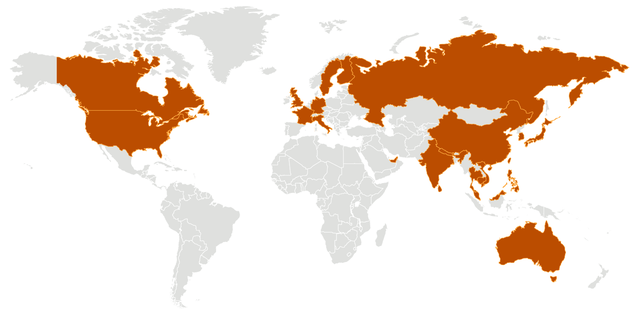
Courtesy of Wikimedia Commons
By Crow’s Nest Staff
As alarm over the coronavirus spreads around the world, the USF administration has assured students, faculty and staff that it is closely monitoring developments.
In an email on Jan. 31, USF system President Steve Currall noted that there have been no cases reported in Florida so far.
But university officials “have initiated communication, coordination and planning with local health departments using the most up-to-date information from state and federal health organizations,” he said.
Currall also shared tips for preventing the spread of all respiratory viruses, urging people to frequently and thoroughly wash their hands and avoid touching their faces with unwashed hands. (See tips, below.)
Meanwhile, USF St. Petersburg spokeswoman Carrie O’Brion said the university’s global initiatives office has decided to cancel the study abroad program to China, which had been scheduled for May.
There are no USF St. Petersburg students studying in China now, she said.
The coronavirus has infected more than 14,000 people – and killed more than 300 – since it began in China two months ago.
Most of the cases, and all but one of the deaths (in the Philippines), have been in China. But more than 100 cases have now been confirmed in 28 other countries, including the United States.
On Jan. 30, the World Health Organization declared the outbreak a global emergency. And the next day the United States declared a public health emergency in this country.
Most airlines have suspended flights between the U.S. and China, and the American stock market has been roiled by the uncertainty and panic around the world.
President Donald Trump’s national security adviser, Robert O’Brien, downplayed the risk of a coronavirus outbreak in the United States, saying on CBS’ “Face the Nation” on Sunday that “right now there’s no reason for Americans to panic.”
Public health officials stress that college campuses, where students are packed into classrooms and residence halls, are particularly vulnerable to viruses, which can spread rapidly even in normal winters.
Health officials note that this was already a bad year for seasonal influenza, which began in mid-November with a surge of influenza B and saw an uptick last month with the H1N1 type of influenza A.
So far this winter, more than 19 million Americans have had the flu, with 180,000 landing in the hospital and 10,000 deaths.
Student reactions to the virus vary. Some attempt to shed light on the situation by posting memes and cracking jokes on the matter. Meanwhile, others, like senior biology major Cathy Mai Do, are not only concerned about the virus but also its reflection on Asian culture and how Americans portray Asian people.
“People already have these stereotypes ingrained around Asians, and the virus helps exaggerate that,” said Mai Do in a Facebook message. “Of course, I am concerned about the virus spreading, but I’m more concerned that people think that ‘Asians deserve this because they eat dog’ and consider that stereotype as an excuse to be horrible to Asians.”
Brianna Rodriguez contributed to this report. Information from The New York Times, Washington Post and Associated Press was also used in this report.
Tips for prevention
Prevent the spread of respiratory viruses by following hand and respiratory hygiene and safe food practices:
- Wash your hands often with soap and water for at least 20 seconds. If soap and water are not available, use an alcohol-based hand sanitizer.
- Avoid touching your eyes, nose and mouth with unwashed hands.
- Avoid close contact with people who are sick.
- Stay home when you are sick.
- Cover your cough or sneeze with a tissue, then throw the tissue in the trash.
- Clean and disinfect frequently touched objects and surfaces.
If you have symptoms
Since it’s cold and flu season, don’t jump to conclusions that you have the coronavirus just because you have the symptoms. If you are sick, make an appointment to see your doctor. Students should contact the following to make an appointment with health professionals:
- USF Tampa: Student Health Services (SHS100) at 813-974-2331
- USF St. Petersburg: Wellness Center (SLC 2200) at 727-873-4422
- USF Sarasota-Manatee: Counseling and Wellness Center (5805 Bay Shore Rd.) at 941-487-4254
If you are severely ill and cannot get to your doctor, call 911 or go to an emergency room at a local hospital.


